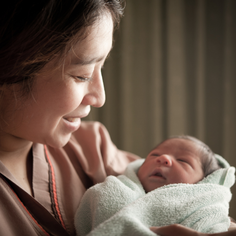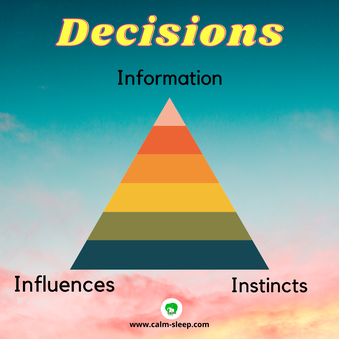The development of circadian rhythms and sleep cycles Newborns do not produce their own melatonin, although human breastmilk does contain tryptophan – the precursor to melatonin. Newborns also do not have a predictable, consolidated or reliable napping pattern. Newborns have short sleep cycles of about 30-40 minutes, and spend most of this time in dream sleep. Dream sleep seems to be important for brain development. In fact, the blood flow to the brain almost doubles during dream sleep. For parents, this means a baby that wakes very easily, specially when placed down in the cot or other sleep surface as dream sleep is lighter sleep. In general, achieving more quiet sleep is indicative of brain maturity, with preterm babies spending a great deal of time in dream sleep. So, more mature babies spend less time in dream sleep and more time in quiet, deep sleep. There are other factors that will influence how your baby sleeps in the early days and weeks related to what happened in birth and the mother’s habits in late pregnancy. But we often have very limited control over these.
need to feed frequently, either by breastmilk or formula. Reach out for support if you need. Use this time to build the bond by maintaining eye contact during feeds – Feeding and eating is a lot more than a ‘task’, it is relational. ‘Talk’ to your baby - When your baby is not feeding but alert, to copy your baby’s facial expressions, interact with your infant. This is the earliest form of communication. Your baby will often stick their tongue out when that action is modelled to them, or make attempts to use facial expressions to respond to noises that you make. Create a ‘day and night’ routine - The day-night rhythms of a newborn are often described as being ‘all over the place’. This will settle down once your baby has established their circadian rhythmicity. This can be sped up by the exposure to broad spectrum daylight for 12 hours per day, with normal activity levels during the day, normal amounts of noise and light, and then a 12-hour period of dark, quiet and reduced stimulation. Some strategies that might help to optimise newborn sleep are listed below:
Practical Tips
And of course - remember to enjoy the crazy early weeks!
0 Comments
You could take 3 different approaches when helping your child adjust to the new time. Take it easy and gentle on the lead up to it - make small adjustments everyday ahead of the clocks changing so when it happens your child’s body is ticking to the new time. You could start 10 days ahead and make small changes to your mornings everyday. This is particularly good for children who are more sensitive to changes or early risers. Go cold turkey: On Sunday when the clocks have changed, just delay wake up times, naps, activities and bedtime by one hour. The wake up times will be a bit off for a few days but your child will adapt. This may be for you if you have a laid back child that takes sudden changes in their stride. Deal with it after the clocks have changed: As it says! Start making changes just on the Sunday and through the following week. You might have some early mornings to start with, but most children have adapted to the new time within 5 days. This may be a good strategy for children who feel very tired.  So what to do? What we are doing is nudging the circadian rhythm by one hour. When we talk about circadian rhythm there are two or three factors that greatly influence how it ticks Light
Light: Light may be the most important environmental factor influencing the awake/sleep body clock. So use it in your favour.
Temperature: Our body's temperature fluctuates throughout the day and night and in fact, it increases as our bedtime approaches. So we tend to sleep more comfortably when it’s on the cooler side.
Feeding: This also has an impact on our circadian rhythm (think about being jet lagged - having meals at the local times will help adapt to the local time quicker). But it is important to appreciate it is most relevant when your baby is having regular meals; this is likely to be happening from around 7 or 8 months.
Important note: if your baby is young or you are having feeding issues, it is best to skip this. These are some gentle changes you can make to adjust your child’s circadian rhythm to the new time. Most children and adults will adopt the new time in around 5 days, but some children are more sensitive and will need extra support through this process.
Once you have all adapted to the new time, remember to have an overhaul of naps and bedtime so it is all ticking along. If you need help with that, you can book a one off video call with me and we can work out how to adjust your days. Enjoy the Autumn! If you’ve been caught with the doubt that what you are doing is or isn’t ok and you are ready to explore what helps you make the right decisions then this is for you. We like to think we make our decisions based on rational thought, yet psychologists have gathered significant evidence that people are very much more irrational than we think. Decisions are based on emotion, habit, beliefs and powerful social expectations, cultural norms and information. All these influence what parents do. So when parents ask me ‘Is it ok…?’ the answer is not as straight forward as one might imagine. In a recent chat with a few new mothers, one brought some information to the others about how two baby products were identical, even being made by the same organisation in the same factory, but with different branding. One mother decided to swap brands as a result of this information, yet there was another who decided to stick with the more expensive brand, even when faced with direct evidence that it was identical to the cheaper version. Her trust and feelings for a brand did not change with the information. Information is power, but just knowing more is not the only player when it comes to what we do as parents and what happens to our children. Biology and circumstances are also important players, as well as support for us to carry out our decisions. So our decisions are influenced by information, influences and instinct and at different times, the top of the triangle ( the strongest factor for us to make a decision) will vary. Being conscious of the factors that influence our decisions will help you analyze if that decision is ok or not. Of course you don’t need to refer back to this triangle every time you make a decision (and there are so many of them everyday), but you may find it helpful if you are not sure.
Feeling confident in what and how we care for our children will also make it easier to navigate through all the conflicting information and opinions around. So next time you hear an opinion, or some advice ask yourself: Is this reliable information? Is this cultural or societal influence? What is my gut instinct saying? How does it work for you, your family and your child in your context? Then embrace this decision and go for it confidently! And have the knowledge that if the information or your circumstances change, you can change and adapt how you parent. Now, I work on the belief that the majority of parents want to do the best for their children, sometimes in difficult circumstances, and with the information and support available to them. I want to support parents to explore ways which they feel are right for themselves and their children. I believe that if parents make a decision contrary to what is suggested by the evidence, then they have taken into account other factors that are more important to them than the evidence from research or their ‘choice’ has been taken away from them somehow. Yet, I am part of ‘‘the context’ and an agent of the ‘support and information available to them’ so I feel some responsibility for providing accurate, timely and helpful information. So if you work with me and decide to do something that is not backed by current evidence to the best of my knowledge, I will send you information and links to have a look at. But ultimately, you are your own judge of what is important and relevant for you, your family and your child. And you don’t have to justify your decisions, especially for people who are not involved in caring for your children. So next time you are faced with the question: Is it ok to…? Use the decisions triangle to help you organize your thoughts and be confident that you are doing what is best for your family and your children. If you want to go deeper into this subject I recommend the book ‘Informed is best: how to spot fake news about pregnancy, birth and baby.’ by Amy Brown |
About meI’m Karina and I’m the founder of Calm Sleep and I help sleep deprived parents achieve better sleep using a caring and holistic approach that takes a broad view of children's needs. I offer an alternative to traditional sleep training Archives
October 2021
Categories |
Proudly powered by Weebly






 RSS Feed
RSS Feed